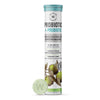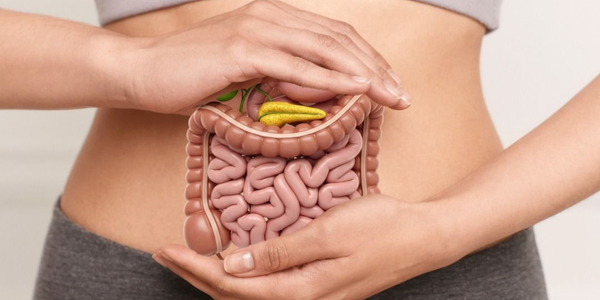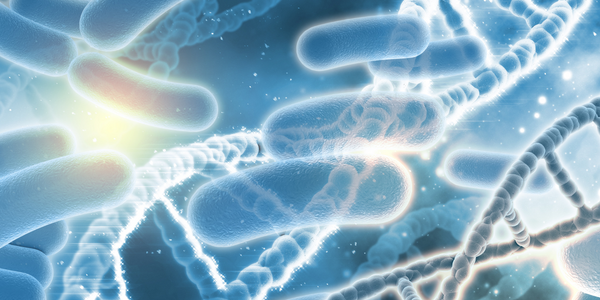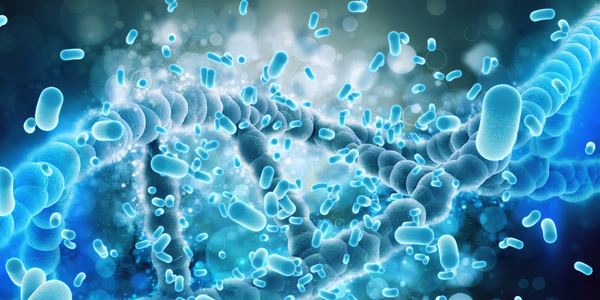If you believed your gut merely helped with digestion, you'd be surprised to learn that it also serves as the ship's captain, guiding various processes in the body ranging from strengthening the immune system to mood and sleep management to skin health maintenance, and so on. This is why it is critical to maintain good gut health.
One way to ensure a healthy gut is to add prebiotic and probiotic supplements to your daily routine that help maintain a healthy balance of the gut microbiome. In our stomach, trillions of microorganisms (bacteria, viruses, and fungi) dwell. But not all microorganisms are bad; some help our digestive tract function properly. A healthy digestive tract contains a balance of both beneficial and harmful microbes that coexist peacefully. When their equilibrium is disturbed, i.e., when the harmful microorganisms outnumber the healthy microbes, they cause a commotion inside the gut, which leads to a range of health issues.
How and what we consume affects our gut health. As a result, it is critical to make informed dietary choices because what we eat affects our gut bacteria, intestinal barrier, and bowel movements, all of which influence gut health. While some meals may help to maintain a healthy balance of gut microorganisms, others may upset this balance. Some gut-strengthening foods promote digestion, while others can cause stomach upset. Follow these tips for a healthy gut to help your gut function optimally.
1. Eat and Chew Slowly
By choosing healthy eating habits, you may give your stomach a head-start so it can work efficiently. If you do not chew your meal thoroughly, you are more likely to experience indigestion, gas production, bloating, constipation, and other digestive issues. Eating quickly or having distractions such as watching television or conversing while eating might have a similar detrimental impact.
2. Fill up on Fiber
Fiber is a component of food that our intestines cannot digest; however, it provides several benefits. High-fiber meals can help with constipation and diarrhea. Soluble fiber, found in oats, barley, carrots, citrus fruits, beans, almonds, apples, and other foods, aids in diarrhea relief by absorbing water, producing a gel, and bulking up the stool. Insoluble fiber, found in beans, nuts, whole wheat flour, wheat bran, berries, cabbage, broccoli, and other foods, increases stool size and speeds up bowel movements, easing constipation through its laxative impact. Thus, high-fiber foods help the gut detoxify.
3. Pick Synbiotic Foods
Synbiotics are foods that include a combination of prebiotics and probiotics. Probiotics are a source of healthy microbes, while prebiotics serve as food for the probiotics. The former is typically present in fermented foods, including kefir, kimchi, kombucha, and probiotic yogurt. Yogurt is a good source of probiotics (healthy microorganisms), which are necessary for a healthy gut and a robust immune system. These good bacteria feed on certain fibers called prebiotics, which help them grow and multiply. Bananas, barley, oats, apples, etc. are some examples of prebiotics. The more we have them, the better our digestion.
Synbiotic foods contain a combination of both prebiotics and probiotics that work in synergy for better gut functioning. Start consuming synbiotic-rich foods or opt for prebiotic and probiotic supplements, which may help boost your intestinal health. These supplements come in various forms, like probiotic capsules, powders, gummies, tablets, effervescent, etc. Go for the ones that serve as synbiotics and are free from empty calories and allergens.
4. Eat Fermented Foods
Fermented foods work as natural probiotics since fermentation is caused by microorganisms. Fermented foods strengthen the gut microbiome by enhancing its diversity and preventing the walls of the intestines from leaking by reducing inflammation. Yogurt, kombucha, tempeh, cottage cheese, fermented vegetables, vegetable brine drinks, and Indian cuisines that use fermentation processes, such as idli, dhokla, and dosa, are all excellent for your stomach. Fermented-food diets have been proven to improve gut flora diversity and lower inflammation rates.
5. Stay Hydrated
Water is the foundation of digestive fluids. Inadequate water or dehydration can cause constipation, which can progress to chronic constipation, leading to various gastrointestinal diseases. Water aids in the digestion of food, the absorption of nutrients, and the removal of waste and poisons from the system. Thus, water consumption is essential for intestinal health. Besides, 20% of our daily fluid consumption is met by hydrating foods. To enhance your fluid intake, you may also add some water-rich foods like watermelons, strawberries, bell peppers, cantaloupe, blueberries, muskmelon, cucumbers, spinach, tomatoes, and cauliflower.
6. Refrain from Gut Irritants
At certain times, factors such as stress, antibiotics, allergens (gluten, spices, caffeine, etc.), alcohol, and certain medications can disturb the digestive system by causing physical damage or irritation or inducing a leaky gut by disrupting the intestinal barrier. When the gut becomes leaky, it loses its ability to filter undigested food, bacteria, and other unwanted materials. When these infections enter circulation, an alert signals the immune system to eliminate them.
When the immune system is activated, it goes into combat mode, attacking even healthy cells due to collateral damage, leading to inflammation and autoimmune reactions such as celiac disease, and irritable bowel syndrome. It may also manifest as skin problems like skin eruptions and dermatitis. So, try to avoid/limit these gut irritants, especially if you have had similar experiences in the past.
7. Limit Processed Foods
Our gut flora changes based on what we eat. Most processed foods contain ingredients such as artificial flavors, emulsifiers, chemical preservatives, stabilizers, trans fats, etc., commonly packaged as hydrogenated or esterified oil, gluten, maltodextrin, etc. They mimic the sensory properties of the natural product while also suppressing its original undesirable features (taste and odor). Increased processed food intake has been linked to a variety of chronic disorders, including obesity, diabetes, heart disease, and cancer, by affecting the gut microbiota.[Text Wrapping Break][Text Wrapping Break]An imbalanced diet, including a lot of processed or junk foods such as high fat, high sugar, low fiber, and low water consumption, causes insufficient nutrient intake and may also lead to diabetes, obesity, cardiac problems, etc.[Text Wrapping Break][Text Wrapping Break] It may also cause the harmful bacteria to thrive while the good ones decrease in number, compromising the intestinal barrier and resulting in a leaky gut.
8. Listen to your Body's Cues
Would you mindlessly keep eating a snack even if you were full? You may say no here, but that's exactly what we do when we are handed a tub of popcorn or chips while watching a movie.
We are all also guilty of eating more than normal when presented with our favorite dish. Pay attention to how you feel later—guilty, bloated, or drowsy. Our body produces the hormones leptin when full and ghrelin when hungry, but at times, these signals (hormones) take time to reach your brain, and by the time they do, you may have already exceeded your limits.
So try a few simple tricks to understand your body's cues, like avoiding distractions and focusing on the food while eating, practicing mindful eating, eating slowly, taking smaller serves, pausing to analyze before refilling your plate, etc.
Overeating or undereating can cause discomfort, make you feel tired, make you prone to obesity, or make you deficient in nutrients. This, in turn, can lower your immunity or lead to metabolic disorders.
9. Adapt your Diet to your Circadian Rhythm
In order to maximize insulin sensitivity and blood glucose control, it’s better to have a larger breakfast and lunch along with a smaller dinner. If you want to keep things easy, try to have a filling breakfast within an hour of waking up and a moderately sized dinner by 7 p.m. Leaving 12 hours between dinner and breakfast offers your digestive system a break and promotes deep, peaceful sleep.
10. Take Help from Gut Supplements
You may further enhance your gut health with the help of gut supplements. You may choose high-fiber supplements for addressing your bowel issues or a synbiotic supplement for the overall health of your gut. While the variety available on store shelves can overwhelm you, filter your product purchase by selecting organic and sugar-free options that contain ingredients with high bioavailability while greatly boosting your gut health. Keep in mind that supplements are not a replacement for healthy eating habits. They just help bridge the nutritional gap and help you achieve and maintain a healthy gut.
Here’s a sample diet plan for your reference to help you add gut-friendly foods to your daily routine!
1. Breakfast
You may start with a synbiotic supplement 20 minutes prior to breakfast. Starting your day with overnight oats and chia pudding will provide you with the perfect healthy start, as it is a great combination of probiotics, prebiotics, and dietary fibre. You may top it with chopped almonds or walnuts for healthy fats that give you the nutty crunch, and sprinkle some cinnamon powder for the natural sweetener that will balance your blood sugar and cholesterol levels too.
2. Lunch
1 Cup Daliya Khichadi with a dash of pure ghee and loads of vitamin- and fiber-rich veggies Couple it with vegetable raita or masala chaas and a green leafy vegetable, along with a traditional homemade amla pickle rich in vitamin C and probiotics.
3. Dinner
1-2 Multigrain rotis, along with gourd (bottle gourd) vegetables and moong dal, will give you the needed dose of fiber and protein, along with complex but easy-to-digest carbohydrates. You may repeat your pickled amla or lemon achaar, as long as it has just the right amount of salt and oil.
For mid-meals, you may sip on buttermilk or coconut water or munch on some nuts and seeds or whole fruits.
Note: For the first week, you may take synbiotic supplements 20 minutes prior to your meal; after that, you may start having them 20 minutes after your meals.
Wrapping Up
Digesting the food that we eat is just one of the many functions that our gut performs. Maintaining gut health is essential for various processes in our body, like regulating mood, boosting immunity, preserving skin health, etc. Food impacts our gut health in a massive way, and indirectly, it is responsible for running bodily processes smoothly. Follow the above food rules for optimal gut health, and do not shy away from including prebiotic and probiotic supplements in your daily regimen.
References
https://www.nhs.uk/live-well/eat-well/digestive-health/good-foods-to-help-your-digestion/
https://www.bbc.co.uk/food/articles/what_should_you_eat_for_a_healthy_gut
https://www.betterhealth.vic.gov.au/health/healthyliving/gut-health
https://www.health.harvard.edu/staying-healthy/feed-your-gut
https://www.gastroconsa.com/the-top-foods-to-avoid-for-a-healthy-gut/
https://www.pcrm.org/health-topics/gut-bacteria
https://kidshealth.org/en/teens/food-poisoning.html
https://www.mountsinai.org/health-library/diseases-conditions/food-poisoning






























Leave a comment